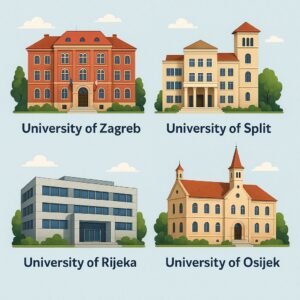Advantages of Studying in Croatia
1- High-Quality Education
Croatia boasts a strong educational system with a good international reputation. Croatian universities are internationally accredited and offer a variety of academic programs in fields such as engineering, science, medicine, business, and humanities.
2- Affordable Costs
Studying in Croatia is relatively affordable compared to many other popular study-abroad destinations. Croatian universities charge low tuition fees, and the cost of living is also considered reasonable.
3- Great Location
Croatia is centrally located in Europe, making it an ideal base for exploring the continent. Students can easily visit nearby countries like Italy, Austria, and Slovenia during breaks or holidays.
4- Rich Culture
Croatia has a rich culture and long history. Students can enjoy many cultural and historical activities, such as visiting old towns, archaeological sites, festivals, and museums.
5- Stunning Natural Beauty
Croatia is known for its breathtaking natural scenery, including beautiful beaches, towering mountains, and picturesque valleys.
Disadvantages of Studying in Croatia
While studying in Croatia has many benefits, there are also a few drawbacks that students should consider before making their decision:
1- Language Barrier
The official language in Croatia is Croatian, a Slavic language not widely spoken internationally. Although many universities offer programs in English, learning Croatian is often necessary to communicate with locals and make the most of everyday life in Croatia.
2- Limited Job Opportunities
It may be challenging for international students to find work in Croatia after graduation. The job market is relatively small, and employers often prefer candidates with local work experience.
3- Bureaucracy
Students might encounter some bureaucratic hurdles when dealing with Croatian government institutions. Official procedures can take longer than expected, and obtaining the necessary information may be difficult at times.
4- Infrastructure
Croatia’s infrastructure is not as developed as that of some other European countries. Students may face some challenges in accessing basic services like public transportation or healthcare.
5- Cost of Living (Relative)
Although the cost of living is reasonable compared to many European countries, it may still be considered high for students from lower-income countries.
6- Social Isolation
Some international students may experience feelings of isolation, especially if they do not speak Croatian. Making new friends and adapting to a new culture can be difficult at first.


 العربية
العربية Türkçe
Türkçe










